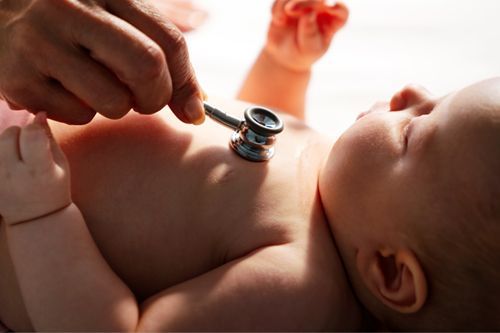RSV: When It's More Than Just a Cold
RSV is a cold that can become serious for babies. When to call your doctor?
What is RSV? Respiratory syncytial (sin-SISH-uhl) virus, or RSV, is a common respiratory virus that usually causes mild, cold-like symptoms. Most people recover in a week or two, but RSV can be serious, especially for infants and older adults.
RSV is the most common cause of bronchiolitis (inflammation of the small airways in the lung) and pneumonia (infection of the lungs) in children younger than 1 year of age in the United States.
Symptoms
People infected with RSV usually show symptoms within 4 to 6 days after getting infected. Symptoms of RSV infection usually include:
- Runny nose
- Decrease in appetite
- Coughing
- Sneezing
- Fever
- Wheezing
These symptoms usually appear in stages and not all at once. In very young infants with RSV, the only symptoms may be irritability, decreased activity, and breathing difficulties.
Most children will have had an RSV infection by their 2nd birthday.
Infants with a higher risk for severe RSV infection include:
- 12 weeks old or younger (at the start of RSV season)
- Premature or low birth weight infants
- Chronic lung disease of prematurity
- Babies with certain types of heart defects
- Those with weak immune systems due to illness or treatments
- Additional risk factors for severe RSV infections include: a mother who smoked during pregnancy, exposure to secondhand smoke, a history of allergies and eczema, not breastfeeding, being around children in a child care setting or living in crowded conditions.
When should you call the doctor?
RSV symptoms are typically at their worst on days 3 through 5 of illness. Fortunately, almost all children recover from an RSV infection on their own.
Call your pediatrician right away if your child has:
- Symptoms of bronchiolitis
- Cough
- Production of mucus, which can be clear, white, yellowish-gray or green in color — rarely, it may be streaked with blood
- Fatigue
- Shortness of breath
- Slight fever and chills
- Chest discomfort
- Symptoms of dehydration (fewer than 1 wet diaper every 8 hours)
- Pauses or difficulty breathing
- Gray or blue color to tongue, lips or skin
- Significantly decreased activity and alertness
Some children with RSV may be at increased risk of developing a bacterial infection, such as an ear infection. Call your doctor if your child has:
- Symptoms that worsen or do not start to improve after 7 days
- A fever (with a rectal temperature of 100.4°F or higher) and they are younger than 3 months of age (12 weeks).
- A fever that rises above 104°F repeatedly for a child of any age.
- Poor sleep or fussiness, chest pain, ear tugging or ear drainage
Is RSV contagious? Yes. RSV spreads just like a common-cold virus―from one person to another.
- Direct person-to-person contact with saliva, mucus, or nasal discharge.
- Unclean hands (RSV can survive 30 minutes or more on unwashed hands).
- Unclean objects or surfaces (RSV can survive up to 6 hours on surfaces, toys, keyboards, door knobs, etc.).
Keep in mind, children and adults can get RSV multiple times–even during a single season. Often, however, repeat infections are less severe than the first one.
What can you do to help your child feel better?
There is no cure for RSV, to help your child feel more comfortable, treat the symptoms as you would a bad cold:
- Nasal saline with gentle suctioning to allow easier breathing and feeding.
- Cool-mist humidifier to help break up mucus and allow easier breathing.
- Hydration, fluids and frequent feedings.
- Acetaminophen or ibuprofen (if older than 6 months) to help with low-grade fevers. (Avoid aspirin and talk to your doctor about cough and cold medications).
How can you protect your children from RSV?
- Wash your hands! Use soap and water and scrub for at least 20 seconds.
- Vaccinate. Keep your children up to date on their immunizations and get the whole family annual flu shots. (Remember, you can get a COVID-19 vaccine and flu shot at the same time).
- Vaccinate your children ages 6 mo.+ against COVID-19.
- Children 5yrs + who had their primary series more than 2 months ago should receive an updated COVID-19 booster ASAP.
- Adults who are around infants – get Tdap vaccine to protect against whooping cough
- Limit your baby's exposure to crowds, other children, and anyone who is sick.
- Keep children home from daycare or school who have fever, especially with a cough, difficulty breathing or shortness of breath, congestion, runny nose, or sore throat, until they are fever-free for 24 hours without medications that reduce fever.
- Clean high touch surfaces in your home frequently with household disinfectants.
- Feed your baby breastmilk. It has unique antibodies to prevent and fight infections.
More information
- COVID-19 & Other Respiratory Illnesses: How Are They Different?
- Treating Bronchiolitis in Infants
- HealthyChildren.org Parent Webinar on RSV
- RSV in Infants and Young Children (CDC)
Reference: CDC, AAP

